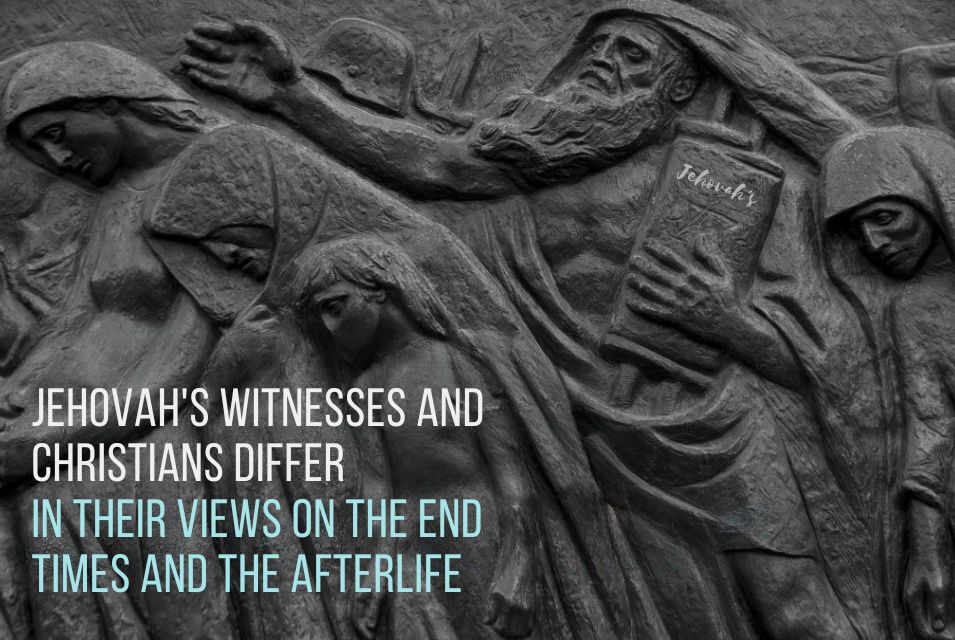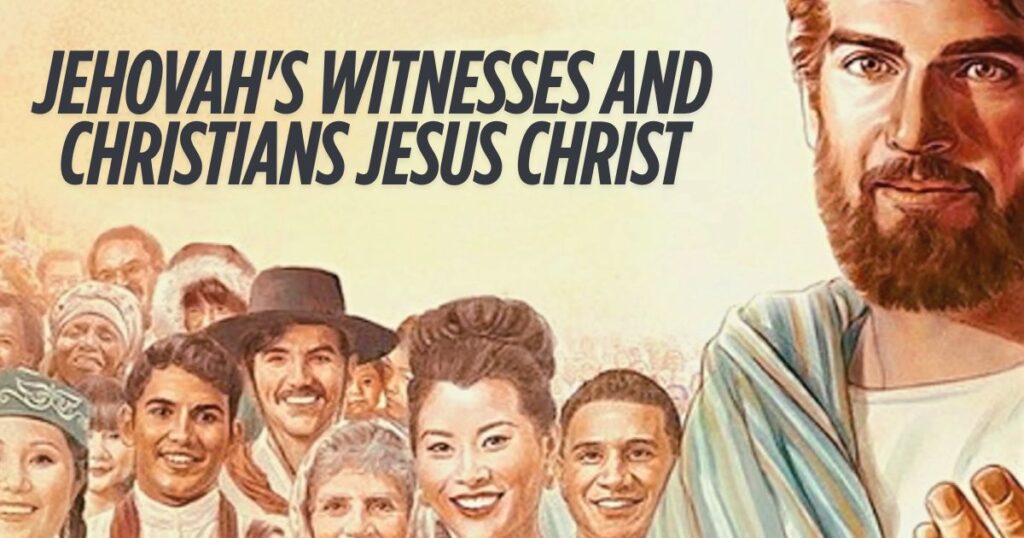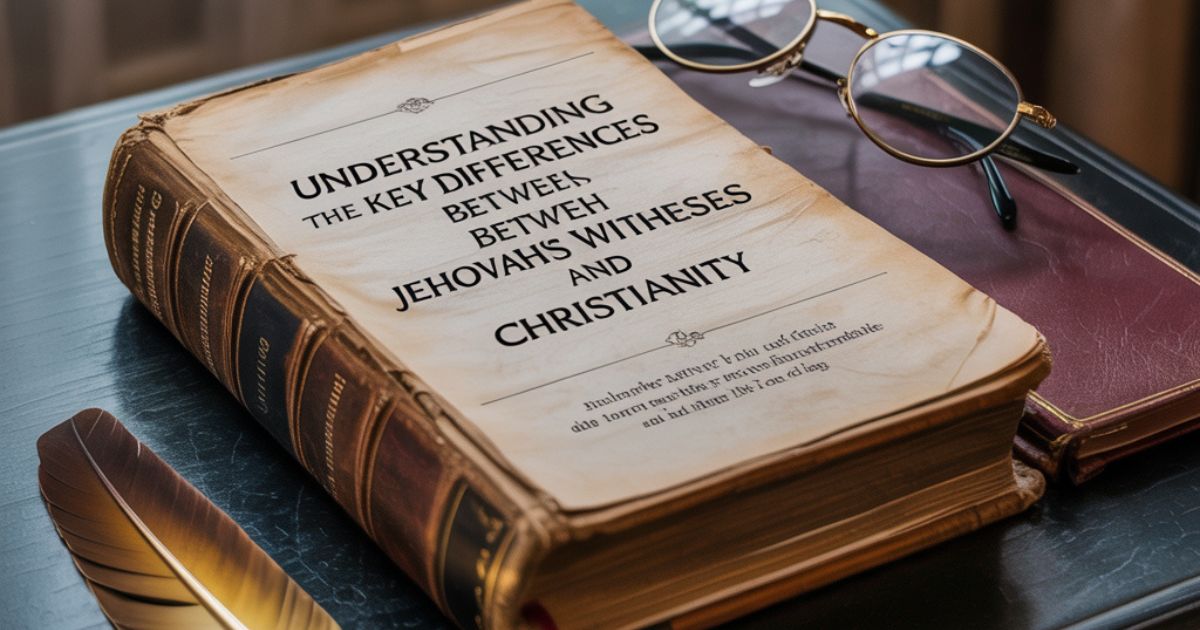You’ve probably encountered them at your doorstep or seen their Kingdom Hall worship centers in your neighborhood. But what exactly separates Jehovah’s Witnesses beliefs from mainstream Christianity? While both groups claim biblical authority, their fundamental differences run far deeper than most people realize.
Many Americans assume Jehovah’s Witnesses represent just another Christian denomination. However, examining their core teachings reveals stark contrasts with traditional Christianity that affect everything from salvation to eternal destiny. These differences aren’t merely theological preferences—they represent entirely different gospels.
This comprehensive guide explores the doctrine of the Trinity, works-based salvation, end times beliefs, and other crucial distinctions. You’ll discover how Jehovah’s Witnesses doctrines diverge from orthodox Christianity and why these differences matter for both believers and seekers.
What are the core beliefs of Jehovah’s Witnesses and how do they differ from Christianity?
Traditional Christianity holds the doctrine of the Trinity as foundational—Father Son Holy Spirit existing as one triune God. This Christian trinitarian belief shapes every aspect of worship, prayer, and theological understanding. Christians pray to Jesus, worship Him as God, and recognize the Holy Spirit’s divine personhood.
Jehovah’s Witnesses categorically reject the Trinity doctrine debate, viewing it as unbiblical paganism. They believe Jehovah stands alone as the supreme God, with Jesus as His first creation. The Genesis 1:2 Spirit interpretation becomes merely “God’s active force” rather than a divine person, fundamentally altering their entire spiritual framework.
This Jesus deity controversy creates vastly different worship experiences. Christians address prayers to Jesus and sing hymns proclaiming His divinity. Jehovah’s Witnesses consider such practices idolatrous, directing all worship exclusively toward Jehovah through Jesus as mediator.
Mainstream Christianity embraces various Bible translations while maintaining core doctrinal consistency. Scholars debate translation nuances, but fundamental truths remain unchanged across versions. This diversity allows believers to study Scripture from multiple linguistic perspectives.
Jehovah’s Witnesses rely primarily on their New World Translation Bible, which contains significant alterations supporting their unique doctrines. For example, John 1:1 interpretation reads “the Word was a god” instead of “the Word was God.” These changes aren’t merely linguistic preferences—they fundamentally alter biblical meaning.
The Watch Tower Society origins under Charles Taze Russell founder established this pattern of reinterpreting Scripture to fit predetermined doctrines. Critics argue this approach violates basic principles of biblical interpretation, while supporters claim it restores original biblical truths.
Christian beliefs emphasize God’s personal, intimate relationship with believers. He’s a loving Father who desires fellowship with His children. This divine trinity allows for complex personal relationships within the Godhead itself, reflecting God’s relational nature.
Jehovah’s Witnesses view God as more distant and hierarchical. While they seek relationship with Jehovah, it’s primarily through organizational channels and proper procedures. The tetragrammaton YHWH debate and YHWH versus LORD naming controversy further illustrates these differences, with JWs insisting on “Jehovah” as God’s exclusive name.
| Core Belief | Traditional Christianity | Jehovah’s Witnesses |
| Trinity | Father, Son, Holy Spirit as one God | God alone; Jesus created; Spirit is force |
| Bible Authority | Multiple translations accepted | New World Translation primary |
| Jesus’ Nature | Fully God and fully human | Created being, Archangel Michael |
| Salvation | By grace through faith alone | Works-based through organization |
| Heaven | All believers inherit eternal life | Only 144,000 go to heaven |
| Hell | Eternal punishment for unbelievers | Annihilation, no eternal torment |
How do Jehovah’s Witnesses view salvation compared to Christianity?
Traditional Christianity teaches salvation comes through faith alone by grace alone. Ephesians 2:8-9 salvation clearly states: “For by grace you have been saved through faith… not by works.” This faith versus grace salvation principle means believers can’t earn their way to heaven—it’s God’s free gift.
Jehovah’s Witnesses embrace works-based salvation requiring active service, meeting attendance, and evangelistic activity. They must earn God’s favor through consistent performance. This salvation by works creates uncertainty since believers never know if they’ve done enough to merit salvation.
The merit-based redemption system fundamentally changes how followers live. Christians rest in Christ’s finished work, while JWs constantly strive to prove their worthiness. This difference affects everything from daily decisions to long-term spiritual confidence.
Christian beliefs offer salvation to all who believe in Jesus Christ. Every believer inherits eternal life in heaven with God. This universal invitation means the gospel applies equally to all people regardless of background or status.
Jehovah’s Witnesses teach that only 144,000 individuals enter heaven as the anointed class. The Revelation 7:4 144,000 passage becomes their doctrinal foundation for limited heavenly salvation. Remaining faithful JWs live forever on a paradise Earth rather than in heaven.
This chosen few doctrine creates a two-tier salvation system. Most JWs don’t even hope for heaven, settling instead for earthly paradise. This earthly paradise teaching fundamentally alters evangelistic motivation and personal spiritual aspirations.
Mainstream Christianity recognizes Jesus as the divine Savior who died for humanity’s sins. His divine nature makes His sacrifice sufficient for all mankind. Christians approach God directly through Jesus as both mediator and Lord.
Jehovah’s Witnesses view Jesus as the perfect human ransom sacrifice who died to balance Adam’s sin. However, they deny His deity, making Him merely Archangel Michael Jesus in human form. This reduced view of Christ affects their understanding of salvation’s scope and power.
How do Jehovah’s Witnesses and Christians differ in their views on the end times and the afterlife?

Traditional Christianity teaches clear eternal destinies: heaven for believers and hell for unbelievers. This binary outcome emphasizes the urgency of gospel decisions. Christians comfort themselves with promised resurrection and eternal life with God.
Jehovah’s Witnesses embrace immortal soul denial, teaching that death ends consciousness until resurrection. They reject hell as eternal punishment, viewing it as simply the grave. This hell as grave doctrine eliminates eternal punishment concerns.
The end times beliefs create different urgency levels. Christians anticipate Christ’s return and eternal rewards, while JWs focus on surviving Armageddon to enjoy earthly paradise. These eschatological views shape daily priorities and long-term planning.
Christian beliefs anticipate Christ’s visible, glorious return when every eye shall see Him. This second coming represents Christianity’s ultimate hope—Christ’s triumphant return to establish His kingdom and judge the world.
Jehovah’s Witnesses teach Christ returned invisibly in 1914, beginning the end times. This prophetic events interpretation means Christ already reigns while remaining unseen. Only JWs recognize this invisible presence and its implications.
The 1914 doctrine affects how each group interprets current events. Christians see increasing turmoil as signs of Christ’s approaching return, while JWs view world conditions as proof of Christ’s invisible reign since 1914.
Orthodox Christianity teaches bodily resurrection for all humanity—believers to eternal life, unbelievers to judgment. This universal resurrection demonstrates God’s justice and the importance of earthly decisions.
Jehovah’s Witnesses describe different resurrection hopes for different groups. The 144,000 receive spiritual bodies for heavenly rule, while others get physical bodies for earthly life. Some wicked people face annihilation rather than eternal punishment.
These apocalyptic beliefs create different preparation strategies. Christians focus on spiritual readiness for Christ’s return, while JWs emphasize organizational loyalty and meeting attendance to survive Armageddon.
How do Jehovah’s Witnesses and Christians differ in their worship practices?
Traditional Christianity embraces Christmas observance and Easter celebration as central to faith. These holiday traditions commemorate Christ’s birth and resurrection—Christianity’s foundational events. Churches worldwide unite in these festive practices.
Jehovah’s Witnesses reject all holiday traditions as having pagan origins holidays. They refuse Christmas celebration and Easter celebration, viewing them as contaminated by ancient pagan customs. This birthday ban doctrine extends to personal celebrations too.
The pagan cross symbol claim illustrates their approach to potentially pagan-influenced practices. JWs avoid anything with possible pagan connections, while Christians evaluate practices by current meaning rather than historical origins.
Christian denominations gather in diverse architectural settings from cathedrals to home churches. This diversity reflects Christianity’s cultural adaptability and theological freedom. Different denominations maintain distinct worship styles while sharing core beliefs.
Jehovah’s Witnesses worship exclusively in Kingdom Halls—simple, uniform buildings without religious symbols. These worship gatherings follow identical formats worldwide, emphasizing organizational unity over cultural expression.
The fellowship differences extend beyond buildings to relationships. Christians enjoy denominational diversity and theological discussion, while JWs maintain strict doctrinal uniformity. This affects everything from Bible study to social interactions.
Sacraments in Christianity include baptism and communion as regular worship elements. These religious meetings incorporate various liturgical practices depending on denominational tradition. Christians participate freely in these faith observances.
Jehovah’s Witnesses practice baptism only after extensive study and organizational approval. Their annual Memorial service replaces communion, but only the anointed class partakes. These restricted prayer rituals reflect their hierarchical structure.
The disfellowshipping practice represents perhaps the starkest difference. JWs completely shun expelled members, while most Christian denominations encourage restoration and reconciliation. This affects family relationships and community dynamics.
How do Jehovah’s Witnesses and Christians differ in their understanding of Jesus Christ?

Traditional Christianity confesses Jesus as “very God and very man”—the deity of Christ remains non-negotiable. This divine nature of Jesus means Christians worship Jesus as God incarnate. The Christ’s divinity affects every aspect of Christian theology and practice.
Jehovah’s Witnesses view Jesus as God’s first creation, the Archangel Michael Jesus who became human. They deny His divine sonship in any ontological sense. This reduced christology affects their worship, prayer, and theological understanding.
The Colossians 1:15-16 Jesus creation passage becomes central to their argument. JWs interpret “firstborn of all creation” as proof Jesus was created, while Christians understand it as referring to Jesus’ supremacy over creation.
Christian beliefs revere the cross as Christianity’s central symbol representing Christ’s sacrifice. Churches display crosses, believers wear cross jewelry, and the cross appears in Christian art worldwide. This symbol unites believers across denominational lines.
Jehovah’s Witnesses reject the cross versus stake crucifixion debate, claiming Jesus died on a single torture stake. They view the cross as a pagan cross symbol unfit for Christian use. This Crux simplex stake teaching affects their religious imagery and symbolism.
The Roman crucifixion method debate involves historical and linguistic evidence. JWs argue their torture stake interpretation aligns with first-century practices, while Christians cite archaeological and textual evidence supporting traditional crucifixion methods.
Orthodox Christianity teaches Jesus currently sits at God’s right hand as Lord and King. Believers pray to Jesus directly, worship Him as God, and anticipate His visible return. This Jesus’ divine status affects daily Christian life and worship.
Jehovah’s Witnesses believe Jesus became heaven’s king in 1914, ruling invisibly while remaining subordinate to Jehovah. They pray only to Jehovah through Jesus as mediator. This affects their worship practices and spiritual relationships.
The God incarnate doctrine versus created being theology creates entirely different approaches to Jesus. Christians address Jesus in prayer and worship, while JWs consider such practices inappropriate for a created being.
How do Jehovah’s Witnesses and Christians differ in their evangelism and outreach efforts?
Christian evangelism employs diverse methods from personal witnessing to mass evangelistic campaigns. This gospel outreach adapts to cultural contexts while maintaining core gospel truths. Mission work takes countless forms across denominations and cultures.
Jehovah’s Witnesses practice systematic door-to-door evangelism as their primary outreach method. They distribute The Watchtower magazine and Awake! publication outreach materials following organizational guidelines. This structured approach ensures message consistency but limits creativity.
The discipleship efforts differ significantly in approach and content. Christians focus on personal relationship with Jesus, while JWs emphasize organizational loyalty and Watch Tower Society teachings. These different goals create different evangelistic strategies.
Traditional Christianity proclaims salvation through faith in Jesus Christ alone. This preaching the gospel emphasizes God’s grace, Christ’s deity, and eternal life for all believers. Evangelistic activities aim to bring people into personal relationship with Jesus.
Jehovah’s Witnesses preach about God’s Kingdom and the need for organizational allegiance. Their message includes JW doctrines about paradise earth, the 144,000, and Watch Tower Society authority. This creates fundamentally different conversion goals.
The Acts 1:8 witnessing command gets interpreted differently by each group. Christians see witnessing as sharing Jesus’ love and salvation, while JWs view it as recruiting people into their organization and teaching system.
Christian denominations often engage in social justice, community service, and charitable work. This mission work reflects Christianity’s concern for both spiritual and physical needs. Churches operate hospitals, schools, and relief organizations worldwide.
Jehovah’s Witnesses maintain political neutrality faith that limits community involvement. They avoid political participation, military service, and many charitable activities. This separation affects their relationship with broader society.
The Romans 13:1 authority teaching gets applied differently. Christians generally participate in civic duties while maintaining spiritual priorities, while JWs interpret this passage as requiring complete political neutrality and non-participation.
Understanding these fundamental differences helps Christians engage JWs more effectively while helping seekers recognize the choice between biblical Christianity and Watch Tower Society teachings. The cult versus Christianity argument ultimately centers on authority: will we submit to Scripture’s clear teaching or accept organizational reinterpretation? This choice determines not just theological preference but eternal destiny itself.
Conclusion
Understanding these fundamental differences helps Christians engage JWs more effectively while helping seekers recognize the choice between biblical Christianity and Watch Tower Society teachings. The cult versus Christianity argument ultimately centers on authority: will we submit to Scripture’s clear teaching or accept organizational reinterpretation? This choice determines not just theological preference but eternal destiny itself.
The stark contrasts between Jehovah’s Witnesses and traditional Christianity extend far beyond surface-level differences. From the Trinity doctrine and salvation by grace versus works, to Jesus’ divine nature and eternal destiny, these represent entirely different gospels. While both groups claim biblical authority, their interpretations lead to fundamentally different spiritual frameworks, worship practices, and eternal hopes.
These aren’t merely theological preferences but core distinctions that affect every aspect of faith, from daily worship to ultimate spiritual destiny. Recognition of these differences is crucial for both believers seeking to understand their faith and seekers evaluating spiritual truth claims.

Chima Kalu is an experienced blog site admin with 4 years of expertise managing content and user engagement on inthebiblethe. Based in Nigeria, he ensures smooth website operations, quality content, and an interactive user experience.








